 Back in November 2005 I wrote about FaceBridge and their "profit from IM/VoIP" model. which enables lawyers, technical people, and other professions to "charge" for their time using their favorite IM or VoIP client. Yesterday, I mentioned how someone was enabling Skype users to "pay" to talk to entertainers such as Penelope Cruz.
Back in November 2005 I wrote about FaceBridge and their "profit from IM/VoIP" model. which enables lawyers, technical people, and other professions to "charge" for their time using their favorite IM or VoIP client. Yesterday, I mentioned how someone was enabling Skype users to "pay" to talk to entertainers such as Penelope Cruz.
And now today (midnight PST, 3am EST my time), a new company called Ether, a new division of Ingenio, is launching their technology that enables the sale of services over the Internet by bloggers, technical people, entertainers, lawyers, etc.. According to Ether, "Ether allows anyone with something valuable to say – traditional service providers like accountants, therapists and legal professionals, as well as other experts and enthusiasts – to earn money by talking on the phone with their audience."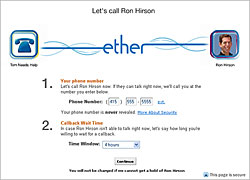 Ingenio is the company behind powering Yahoo Yellow Pages click-to-call service, AOL Yellow Pages click-to-call services, and others. Ingenio's model is that the Pay Per Call was free for consumers to use and they simply charge and connect the call to the highest per-minute bidding advertiser. The advertiser is billed based on the length of the call and their per-minute bid. Ether on the other hand enables much more than traditional advertisers to talk with clients -- it enables bloggers, experts in their field, famous people, technical people, etc. or simple everyday netizens with some valuable "niche" knowledge to talk "for free" while the person requesting assistance is charged a set fee for a certain period of time. In theory, one could use Ether for a "hosted" 900-number adult phone sex service. Won't be long I suppose before college women try Ether by putting up provocative photos of themselves with their going "talk" rate.
Ingenio is the company behind powering Yahoo Yellow Pages click-to-call service, AOL Yellow Pages click-to-call services, and others. Ingenio's model is that the Pay Per Call was free for consumers to use and they simply charge and connect the call to the highest per-minute bidding advertiser. The advertiser is billed based on the length of the call and their per-minute bid. Ether on the other hand enables much more than traditional advertisers to talk with clients -- it enables bloggers, experts in their field, famous people, technical people, etc. or simple everyday netizens with some valuable "niche" knowledge to talk "for free" while the person requesting assistance is charged a set fee for a certain period of time. In theory, one could use Ether for a "hosted" 900-number adult phone sex service. Won't be long I suppose before college women try Ether by putting up provocative photos of themselves with their going "talk" rate.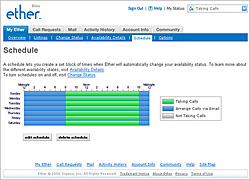 Essentially, Ether manages the scheduling, communication, and the financial transaction (credit card) between sellers and their audiences. Ether automatically bills the client and then deposits the money in the sellers account minus the 15% cut that Ether takes . Say you're an expert on VoIP and you want to sell your VoIP knowledge for $50 for 30 minutes. You simply fill out your Ether profile, enter in your areas of expertise and then set your price. People can then search and find your profile or you can even place a button on your website or blog and the button will display your current "presence" information. As part of your profile you can set which days or the time of day you are willing to speak.
Essentially, Ether manages the scheduling, communication, and the financial transaction (credit card) between sellers and their audiences. Ether automatically bills the client and then deposits the money in the sellers account minus the 15% cut that Ether takes . Say you're an expert on VoIP and you want to sell your VoIP knowledge for $50 for 30 minutes. You simply fill out your Ether profile, enter in your areas of expertise and then set your price. People can then search and find your profile or you can even place a button on your website or blog and the button will display your current "presence" information. As part of your profile you can set which days or the time of day you are willing to speak.
MyEther Profile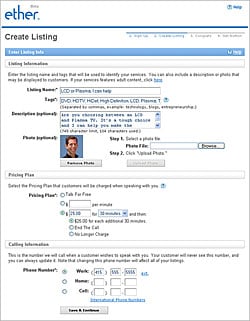
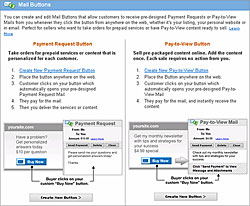 Ether supports clients reaching you either via your Ether phone number (888-MY-ETHER plus a unique extension to each seller) or via a website call button. Both options will prompt the caller to enter in their credit card information (via IVR prompts or a website form) before connecting the call to both the client and the seller (a two leg call). Since your Ether phone number is configured to route the call to any phone number where you are currently located, the call will then be connected to wherever you are. Once the credit card information has been verified, Ether will then ring both the client and the seller and bridge the two legs of the call.
Ether supports clients reaching you either via your Ether phone number (888-MY-ETHER plus a unique extension to each seller) or via a website call button. Both options will prompt the caller to enter in their credit card information (via IVR prompts or a website form) before connecting the call to both the client and the seller (a two leg call). Since your Ether phone number is configured to route the call to any phone number where you are currently located, the call will then be connected to wherever you are. Once the credit card information has been verified, Ether will then ring both the client and the seller and bridge the two legs of the call.
It is worth pointing out that Ether actually leverages VoIP and utilizes several termination service providers to connect the call to the PSTN. Through their partnerships with these VoIP termination service providers Ingenio is able to keep their costs down, but Ingenio is still incurring the cost of connecting both "legs" of the call. I asked Ether if they were requiring users to set a "minimum" price to charge clients so Ether doesn't find itself "losing money" on the call connection fees. They stated that they are not currently asigning a minimum price and are aware of the financial risks and plan to monitor it for "abuse". I also asked what sort of systems they were using on the back-end and they mentioned all of their stuff was "home grown" as well as some open-source stuff, including an open-source SIP stack.
MyEther webpage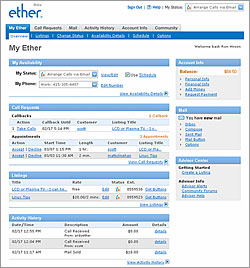
What is interesting is that Ether chose not to offer a per-minute model since they found that professionals such as lawyers and therapists would rather not waste their time taking short calls. For instance, they won't know that a call is only going to be 3 minutes long. Even at $4/minute that only results in $12 which in many instances isn't worth it. They tend to prefer "bulk" pricing that has a minimum value built in, say $50, for them to be willing to take the call. Thus, Ether lets Ether users charge a "set amount of money for a set amount of time". For instance $25 for 30 minutes.
You can also dictate what happens at the end of that time. So if you reach the 30 minute limit, you can have the IVR pause the call and make the user pay an additional $25 for another 30 minutes. You can also choose to have the system automatically end the call at the end of the time. Another option is to let the call continue "free of charge" at the end of the time period and simply play a "chime" when the time has been reached. This lets therapists and their clients to finish their sentence or thought, but also enable the therapist to gracefully end the call if the client runs over by simply saying, "You heard the chime, I'm afraid our time is up." So Ether definitely built in some flexible call handling and billing options.
Presence & Scheduling
Ether supports 12 different presence states for the Web-based call button, including Busy, Arrange a call with me, Schedule a call, and more. Both from the IVR or using the web call button you can schedule a call for a future date/time and the Ether will automatically ring both phones to connect the call. Relatedly, as the client you can also set a "call window" for how long you are willing to wait for a callback, such as a 4 hour window. This is useful since the "expert" you are trying to reach may not be available at an exact time. In addition, you set the hours when you’d like calls to come through, such as noon to three on Mondays, or daily from 9:00 to 5pm. Your phone only rings when people pay to talk to you during the hours you want.
Ether is an interesting concept and certainly something I have talked about in the past. I've mentioned for instance that with eBay's acquisition of Paypal and Skype, they have all the pieces needed to make it easy for auction sellers & buyers to interact. Social networking sites such as MySpace would be a perfect fit for something like Ether. Another good potential integration might be to integrate Ether into Google Answers or Yahoo Answers. These two popular sites would benefit users looking to be able to talk to technical experts rather than just interact via non-interactive time-delayed text postings.
The beauty of the Ether product is that its free and you can easily integrate it into your website, blog, forums, etc. Ether essentially acts as the hosted mediator of presence information, billing and payment, and PSTN termination. Many of today's online service providers have a dedicated audience whether mass or niche and the ability to attract significant Web traffic. With this traffic is the opportunity to empower those with an independent or entrepreneurial bent to generate new revenue streams from their insights and knowledge.
From March 1 - March 21 Ether will be available for beta testing on a limited, invite-only basis. The product will launch in early Q2 2006.
android apple asterisk at&t blackberry cell phone cisco dell digium e911 facebook fcc google google talk gps im ip-pbx ipad iphone ipod itexpo ITEXPO lync microsoft mobile phone open source outage phone review sip skype sony unified communications verizon video video conferencing voip vonage wireless xbox 360
- Apple (280)
- Bittorrent (2)
- Call Center and CRM (48)
- Computer Hardware (183)
- Computer Software (71)
- Gadgets (650)
- Google (225)
- Home Entertainment (263)
- Internet (173)
- Linux (111)
- Microsoft (376)
- MovableType (48)
- News (187)
- Personal and Humor (118)
- Politics (9)
- Reviews (246)
- Security (2)
- Social Networking (42)
- Sports/Outdoor Technology (9)
- Tablets (32)
- Technology and Science (355)
- Unified Communications (471)
- VoIP (2285)
- Wireless (584)
- p2p (20)
- March 2014
- February 2014
- January 2014
- December 2013
- November 2013
- October 2013
- September 2013
- August 2013
- July 2013
- June 2013
- May 2013
- April 2013
- March 2013
- February 2013
- January 2013
- December 2012
- November 2012
- October 2012
- September 2012
- August 2012
- July 2012
- June 2012
- May 2012
- April 2012
- March 2012
- February 2012
- January 2012
- December 2011
- November 2011
- October 2011
- September 2011
- August 2011
- July 2011
- June 2011
- May 2011
- April 2011
- March 2011
- February 2011
- January 2011
- December 2010
- November 2010
- October 2010
- September 2010
- August 2010
- July 2010
- June 2010
- May 2010
- April 2010
- March 2010
- February 2010
- January 2010
- December 2009
- November 2009
- October 2009
- September 2009
- August 2009
- July 2009
- June 2009
- May 2009
- April 2009
- March 2009
- February 2009
- January 2009
- December 2008
- November 2008
- October 2008
- September 2008
- August 2008
- July 2008
- June 2008
- May 2008
- April 2008
- March 2008
- February 2008
- January 2008
- December 2007
- November 2007
- October 2007
- September 2007
- August 2007
- July 2007
- June 2007
- May 2007
- April 2007
- March 2007
- February 2007
- January 2007
- December 2006
- November 2006
- October 2006
- September 2006
- August 2006
- July 2006
- June 2006
- May 2006
- April 2006
- March 2006
- February 2006
- January 2006
- December 2005
- November 2005
- October 2005
- September 2005
- August 2005
- July 2005
- June 2005
- May 2005
- April 2005
- March 2005
- February 2005
- January 2005
- December 2004
- November 2004
- October 2004
- September 2004
- August 2004
- July 2004
- June 2004
- May 2004
- April 2004
- March 2004
Featured Videos













